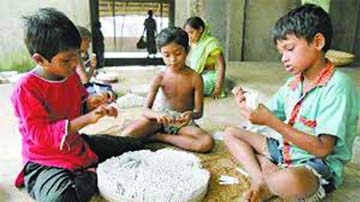
Md Mahabub Alam back from Rangpur :
Several thousand women and children work in tobacco leaf processing, cigarette and bidi factories in the district of Rangpur despite negligible daily wage, as they have no second option.
The income their male members earn, Tk 200 to Tk 250 daily on average, can hardly meet their necessities. As such, the deficiency brings females and children out of house for work.
This was stated in a two-day workshop on ‘Advocacy and Communication Development Project for Women and Children’ (4th phase) organised by Bangladesh Sangbad Sangstha (BSS) under the Ministry of Information and funded by United Nations International Children Education Fund (UNICEF) on January 26 and 27.
Assistance for Social Organisation and Development (ASOD), a Non-Governmental Organisation (NGO) said, about 40 per cent lands of Haragachh and Sharai unions are used for tobacco cultivation, promoting setting up of 60 cigarette and bidi factories there.
The child labour in the areas is more than any other parts of the district, the NGO official says. The total population of Haragachh is 23,167. Of them, women and children of 455 families work in different tobacco processing, cigarette and bidi factories.
At Sharai, women and children of 825 families work in these factories, as they did not find any other source of income. They work more but earn very little, the organisation states.
Anwarul Islam, Monitoring Officer of ASOD told the reporters that the children between 10 and 12 years of old are more suitable than their adults to make bidi and cigarette.
The factories owners can get 1,000 to 1,200 cigarettes or Bidis in six hours from 8:am every day whereas a child worker is paid Tk 80 to Tk 100 as wage. But an adult earns Tk 200 to Tk 300 for making 500 bidis at the same time, he said. Md. Abu Nayeem, Project Manager of ASOD said, many people have, however, migrated from the occupation. “So, if non-tobacco industries are established here, the tobacco workers are likely to go there subject to better pay and other facilities”, he said.
With reference to many guardians, he said that they hardly showed interest in educating their children, fearing that they would be forced to pay bribe for jobs.
When this reporter visited Husna Tobacco (Pvt) Ltd at Uttam in the sadar area, more than 80 women of different ages were found to remove spot on tobacco leaves to make them useable.
Tahmina, inhabitant of the area, told The New Nation that she used to earn Tk 100 by working from 8am to 4:00pm.
“I have no option but to work in the factory, as there is in no other opportunity”, she said, ” I will simply starve with my lone son, Tuhin, 1o, unless I work in the factory”. Another female worker Anowara, 50, from Doctor Para, Meneka from Uttam echoed the similar statement.
Monjusree Saha, Head of Programme Coordination of RDRS Bangladesh, a Non-Governmental Organisation (NGO) told the journalists that the tobacco related companies allured the farmers to cultivate the tobacco by supplying them seeds, fertilizers and cash money.
Once in the past, the government organisations and NOGs succeeded to convince many farmers to opt for vegetables farming leaving tobacco by organizing different awareness programmes, she said. But the success was short-lived because of the low prices of the products and the greed of the owners of the bidi and cigarette factories.
Manjusree said, a section of middlemen eat up the lion portion of the wages of women and children who work in such factories.
“These middlemen make contact with the desirous females and children and engage them in the factories in exchange of monthly payment from both sides, employers and employees,” said the official.

